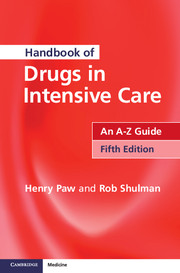Book contents
D
Published online by Cambridge University Press: 05 November 2014
Summary
DALTEPARIN (Fragmin)
A low molecular weight heparin (LMWH) with greater anti-Factor Xa activity than anti-IIa (antithrombin) activity, which theoretically makes it more effective at preventing thrombin formation than standard (unfractionated) heparin with an equal anti-Factor Xa and anti-IIa ratio.
After SC injection, LMWHs are better absorbed than unfractionated heparin, and bind less to proteins in plasma and in the endothelial wall. As a result they have around 90% bioavailability compared with 10–30% with unfractionated heparin. After SC injection, the plasma half-life of LMWHs is around 4 hours, enabling a single dose to provide effective anti-coagulant activity for up to 24 hours in the treatment of venous thromboembolism, peri- and postoperative surgical thomboprophylaxis, and the prevention of clotting in the extracorporeal circulation during haemodialysis or haemofiltration.
The incidence of bleeding is similar between LMWHs and unfractionated heparin. The incidence of immune-mediated thrombocytopenia is about 2–3% of patients treated with unfractionated heparin, typically developing after 5–10 days' treatment. In clinical trials with dalteparin, thrombocytopenia occurred in up to 1% of patients receiving treatment for unstable angina, undergoing abdominal surgery or hip replacement surgery.
LMWHs are preferred over unfractionated heparin because they are as effective, simplify treatment (once-daily dosing, no IV cannulation), have a lower risk of heparin-induced thrombocytopenia and monitoring is not required.
- Type
- Chapter
- Information
- Handbook of Drugs in Intensive CareAn A-Z Guide, pp. 63 - 85Publisher: Cambridge University PressPrint publication year: 2014



